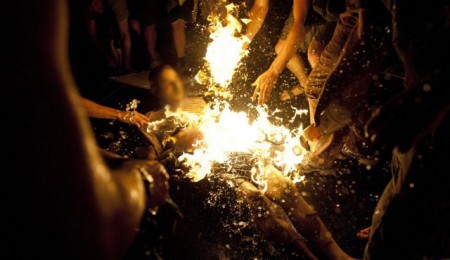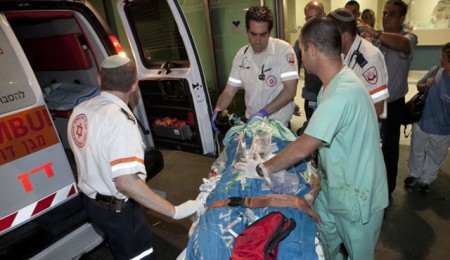EDITOR: Now Israel gets its own martyr of the social struggle
It had now come to that: An Israeli man burns himself in public, as did people before him in other countries, and recently, in Tunisia. The difference is that after more than a year of mass protest, the struggle in Israel has nothing to show in the way of successes – the situation is even worse than it was a year ago! While most Israelis find it difficult to survive in dignity, the economy is growing, the multi-billionaires are getting richer, and the government is diverting the public into mock issues such as the Iran threat and the Haredi refusal to serve in the Occupation Army.
Between Tunisia and Israel: A personal tragedy becomes the symbol of Israel’s social struggle: Haaretz
The tragic act of Moshe Silman setting himself on fire during a social protest reflects the depth of the gaping chasm between the people and the government.
By Or Kashti | Jul.15, 2012

The desperation that led Haifa resident Moshe Silman to set himself on fire on Saturday night in Tel Aviv, exactly one year after the first tents were erected on Rothschild Boulevard, is a tragic example of the depth of the gaping chasm between the people and the government, a break in the making for years, and has been on full display since last July.
Government spokesmen will most definitely claim that Saturday night’s tragedy does not reflect the general situation in the country, which they’ll say is constantly improving. They’ll say that over the past year, they have been more attentive than ever to the plight of the people.
The letter left behind by Moshe Silman depicts a piercing reality that unfortunately is not unique to him: A monthly allowance of NIS 2,300, no money to pay for medication or rent, and “I can’t even live month to month. I won’t be homeless, and so I am protesting.”
Those are the words of a man with no choice left but to set himself on fire, in a last-ditch attempt to show the world how desperate his situation is.
In Tunisia it was Mohamed Bouazizi, the vendor that set himself on fire and brought the protests there into worldwide focus in December 2010. Will Bouazizi’s Israeli equivalent inspire the government to do some soul searching? Will he inspire some kind of rehabilitation for the system that pushed him to this terrible act? Most likely, an “investigational committee” will be opened. It is already possible to guess the outcome of the investigation – the system worked the way it was supposed to.
Perhaps the idea of independent investigation is naïve, though we must not give in to this notion. We must demand change, through more protests and rallies, and expand upon the basic questions. For example, the waiting list for public housing.
Bouazizi, we must remember, did not set himself on fire to bring Democracy to Tunisia. It was an act of protest directed at Sidi Bouzid municipality officials, who confiscated his mobile produce stand. The subsequent protests proved to be unstoppable, not in Tunisia, nor anywhere else. Facing protests of this nature, the government best keep quiet.
The tragedy of Silman’s act stresses the principle questions facing the socioeconomic policy in practice in Israel over the last 30 years. For years Israel has not been a welfare state, in which every citizen has a safety net to catch them in the event of hardship.
The disdain of Israeli government, specifically the current government, for the ideas of social justice raised by the protests, has been revealed over the last year. That is one of the protest’s more impressive achievements.
The thousands who took the streets of Tel Aviv, Jerusalem, Haifa, and Be’er Sheva on Saturday night attest to the depth of the change created by the social protest: last year, calls for social justice were made by a small minority, and met with raised eyebrows. A year later, the public discourse has fundamentally changed. Despite intricate government attacks – promises made and forgotten, public relations spin, and police brutality – the protest has not disappeared, and nor is there a reason for it to do so. The protest is here to stay.
Israeli man sets himself on fire during Tel Aviv social protest: Haaretz
Protester in serious condition after he poured gasoline on his body and set himself on fire; in letter he left behind, he says, ‘the state of Israel robbed me.’
By Yaniv Kubovich, Ilan Lior and Talila Nesher

Moshe Silman, a 57-year-old Haifa resident, set himself on fire Saturday during a Tel Aviv demonstration marking the anniversary of last summer’s social protests.
As thousands marched down Kaplan Street to mark a year since the start of social protests, as Silman poured gasoline on his body and set himself on fire.
Silman was evacuated to Ichilov Hospital shortly afterward.
“The state of Israel stole from me and robbed me. It left me helpless,” wrote Silman in a letter he left at the scene.
“Two Housing and Construction Ministry committees rejected me, even though I had a stroke,” wrote Silman in the letter, adding that the facts could be checked with a public housing company in Haifa.
In the letter, Silman wrote that he blames “the state of Israel, Prime Minister Benjamin Netanyahu and Finance Minister Yuval Steinitz, for the humiliation that weakened citizens go through every day, taking from the poor and giving to the rich.”
Yonatan Sahar, a protester who witnessed the incident, said that he was standing next to the man, when suddenly he set himself on fire.
“I saw him holding something burning,” he said. When suddenly he poured gasoline on himself and immediately caught fire. “I didn’t know what to do,” he added.
According to medical officials, the man is currently in serious condition.
Dozens of protesters arrived at Ichilov Hospital after hearing about the incident. Police forces prevented their entry, while filming the protesters who held signs condemning the Finance Minister Yuval Steinitz and Tel Aviv Mayor Ron Huldai. Protesters also remained at the site where the man lit himself on fire.
Ofer Barkan, a social protest activist from Haifa, said that the man was an activist in last year’s protests. “We met him last summer,” Barkan said, “he was a completely normative person who lived in Tel Aviv but then his business went under. He became a cab driver and suffered a stroke which left him unemployed. He moved from Tel Aviv to Haifa because he could not afford life in the city.” According to Barkan, he had threatened to light himself on fire multiple times. “We felt that he was close to do it, but we didn’t know,” he added.
Activists are planning to march from Silman’s home to the Haifa municipality tomorrow.
Earlier on Saturday, thousands of Israelis gathered in several cities throughout the country to mark one year since the start of the social protests.
Thousands protested in Tel Aviv, while hundreds took to the streets in Haifa, Be’er Sheva, Jerusalem, and Afula.
Daphni Leef, the woman who launched the social protest, told Haaretz on Saturday that one year later, the activists’ message hasn’t changed.
“We want a fair society,” she said. “Today we are also celebrating. Suddenly, when people take to the streets they understand that they have power and that they are right.”
EDITOR: Who and what is illegal…
In the Occupied Territories, illegally held since 1967, the UN is trying to keep up appearances, after decades of indifference, and is examining the illegal activities of Israel. So Israel has indeed declared it illegal to investigate its crimes…
Israel mulls sanctions on UN agency in West Bank due to staffers’ illegal activity: Haaretz
Israel wants to ‘reassess’ role in the West Bank of the Office for Coordination of Humanitarian Affairs.

The Foreign Ministry and Israel Defense Forces are considering imposing sanctions against a UN agency in the West Bank and Gaza following allegations that agency employees have engaged in illegal activity such as illegal construction.
As senior officials in Jerusalem put it, Israel wants to “reassess” the role in the West Bank of the agency, the Office for Coordination of Humanitarian Affairs.
The two options under consideration are limiting the issuing of visas to OCHA employees and rescinding work and travel permits to local residents who work for OCHA.
Over the past six months, there has been a major deterioration in relations between OCHA and the Israeli government, a senior Israeli source said. Israeli officials have been furious over the conduct of OCHA staff in the part of the West Bank under full Israeli civil and military control.
Known as Area C, this area comprises 55 percent of the West Bank and includes the Jewish settlements, IDF firing ranges and most of the Jordan Valley and Judean Desert. It is estimated that about 120,000 Palestinian live in Area C.
The senior Israeli official said OCHA had promoted several projects in Area C without Israeli approval including illegal construction. Senior officers from the office of Maj. Gen. Eitan Dangot, the IDF’s Coordinator of Government Activities in the Territories, asked OCHA’s director in Israel to immediately halt the illegal activities, but nothing has changed.
The Coordinator of Government Activities in the Territories, COGAT, oversees civilian activities in the West Bank.
Israeli ire over the issue is so great that Dangot ordered a halt to all OCHA’s illegal project work and instructed that a demolition order be issued for any illegal construction. Dangot also asked that the Foreign Ministry lodge a formal complaint at the United Nations in New York.
About a week ago, officials from the Foreign Ministry, Dangot’s office and other ministries met to consider the sanctions against OCHA.
“OCHA’s activity harms other UN agencies helping the Palestinians,” a senior Israeli official said. “The agency encourages the delegitimization of Israel through false reports that it distributes to the entire international community, creating irreversible damage to the entire UN.”
On July 10, Israel’s UN ambassador, Ron Prosor, sent a harsh letter to the UN’s undersecretary for humanitarian affairs, Valerie Amos, who directly oversees OCHA. Prosor expressed Israel’s desire to put matters in order regarding OCHA’s activities in the West Bank and Gaza.
To read the full letter click here
According to Prosor, “since from the beginning of OCHA’s operations in the PA [the Palestinian Authority], 12 years ago, its presence was never officially established,” Prosor wrote in the letter, a copy of which was obtained by Haaretz. He said Israel would like to start a “dialogue with OCHA in regard to its status and activities in the West Bank and Gaza Strip.”
According to Prosor, “In spite of its continual overtures, Israel has received only one statement that addresses OCHA’s actions and staff − a letter that dates back to 2004,” he wrote. He said the situation in the West Bank and Gaza had “changed considerably since then, and we therefore believe there is a need to review OCHA’s role in light of the current situation.”
Prosor asked Amos for a full list of OCHA’s staff and employees in the West Bank and Gaza, “including full name, location and job description.” He also asked for “a review of OCHA’s main activities in the past two years and its prediction for future activities.”
Prosor also requested clarifications about the roles played by OCHA and “other UN bodies providing assistance to the Palestinian population.” These other agencies include the the UN Relief and Works Agency, the UN Development Program, and the World Food Program.